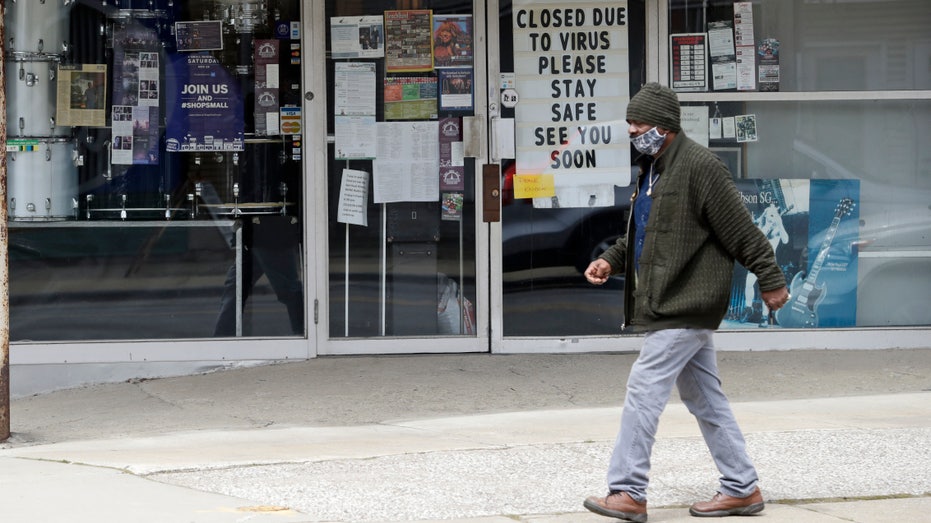Not reopening in coronavirus risks permanent economic damage: officials
'It's a risk if we don't do anything, it's a risk if we do this,' Ohio governor says
Get all the latest news on coronavirus and more delivered daily to your inbox. Sign up here.
Treasury Secretary Steven Mnuchin warned "Fox News Sunday's" Chris Wallace that if we don't reopen the economy soon, the country will be risking "permanent economic damage."
"If we do this carefully working with the governors, I don't think there is a considerable risk," Mnuchin said. "Matter of fact, I think there is a considerable risk of not reopening. You're talking about what would be permanent economic damage to the American public."
According to Mnuchin, U.S. unemployment "could be" close to Great Depression levels at 25 percent.
"Unlike the Great Depression where you had economic issues that led to this, we closed down the economy," Mnuchin said. "The reported numbers are probably going to get worse before they get better. That's why we're focused on rebuilding this economy."
Ohio, which could see roughly 90 percent of its economy reopened by the end of the week, is one of the states focused on economic recovery despite rising coronavirus cases.
Ohio Gov. Mike DeWine told "Fox News Sunday" that we run the same risks whether we reopen the economy or not.
"It's a risk if we don't do anything, it's a risk if we do this," DeWine said. "The economy is not going to open no matter what we do, whatever we order, unless people have confidence and we're trying to give them confidence but at the same time we're telling them, look, the virus is still out there, it's still very very dangerous, we have to keep the distancing, people should wear a mask, wash your hands. I mean these are basic things that we have to do, we can't let up.”
According to DeWine, Ohio has hit a plateau in regards to hospitalizations, deaths, and new coronavirus cases, but acknowledged that it isn't on a downward trajectory as the number of coronavirus cases in the state hit a new high of 885 on Friday, according to the Ohio health department.
"We wish we were going down, [but] we're not,” DeWine said.
He also noted, however, that Ohio has been hit "exceedingly hard" economically as over 1 million people in the state have applied for unemployment.
"We have been hit in Ohio just like other states have been hit economically, so we have got to try to do two things at once," DeWine said. "No one is underestimating how difficult this is, but it is something that we have to do."

A man wearing a mask walks past "The Music Emporium," during the coronavirus pandemic May 6, 2020, in Cleveland. (AP Photo/Tony Dejak)
While DeWine said that we can't "underestimate the businesses that are suffering" and "underestimate the workers who don't have jobs," he believes reopening the economy will be dependent upon how well people follow social distancing measures and other state guidelines.
"Our future, our ability to open up Ohio is going to depend with whether people continue to do the social distancing," he said. "We have some very tough standards as we are reopening but it’s going to come down really to the average citizen."
If people don't follow the state’s guidelines, DeWine warns that the economy may have to be shut down again.
"We've got to be very careful as we do this because if we're not careful we're going to roll backwards, we're going to have to shut things down and that’s not what anyone wants to see."
GET FOX BUSINESS ON THE GO BY CLICKING HERE
Director of the Center for Health Security of the Johns Hopkins Bloomberg School of Public Health Dr. Tom Inglesby told Wallace that it’s important to find a balance between reopening the economy and keeping people safe.
"We believe strongly that [reopening the economy] needs to be a near term goal. We just have to do it in a way that is as safe as possible," Inglesby said.
In order to find that balance, Inglesby says that we need to instill confidence in the American people that the coronavirus is under control.
"The way that [other countries] restored their economies really is to give people a sense of confidence," Inglesby said. "We have to show people that this disease is under good control and people will then have confidence in going out and reengage in the economy."
Inglesby added that the way we take control of the epidemic is by ensuring we have "very, very substantial diagnostic testing capability in place around the country" and "the ability to trace the contacts of patients," but he also stressed that the virus won't disappear until we find a vaccine.
"This virus isn't going to go away," Inglesby said. "Hopefully, over time, we'll learn to live with it, and we'll be able to reduce the risk of transmission, but it's going to stay as a background problem in the country and around the world until we have a vaccine."
CLICK HERE TO READ MORE ON FOX BUSINESS
According to the latest update by Johns Hopkins University, there are more than 1.3 million confirmed coronavirus cases and more than 78,000 deaths in the United States. The Labor Department's latest jobs report showed 20.5 million people lost their jobs in the month of April as a result of the pandemic.






















